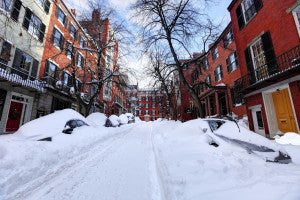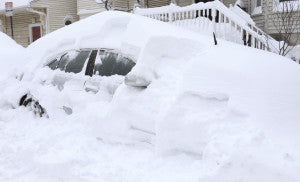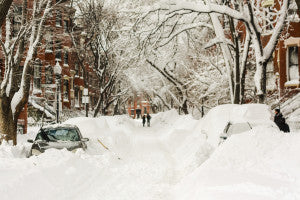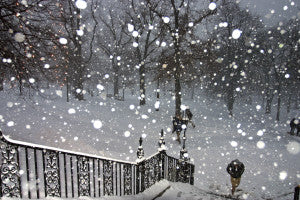Through late January 2015, Boston’s winter was abnormally warm. December was the warmest on record, with temperatures
nearly 4 degrees above normal. The city’s snowfall total was
60 percent less than normal.

That changed January 24. In less than four weeks, five storms dumped almost 8 feet of snow, obliterating records. Two of the storms were among the ten largest recorded. The eventual season total was 110.6 inches of snow, a record and almost 44 inches above average. The arctic weather brought arctic chill. The temperature didn’t hit 40 degrees from January 20 through March 3,
another record.
Andrew Thimmig and his wife, Julie, lived through that winter. They lived in Somerville, Mass., two miles northwest of Boston, in a three-story home converted into apartments.
Here’s what they experienced, as Andrew described it. The interview was edited for brevity and clarity.
Q: How did you prepare for winter?
We didn’t do any extra preparation. We got snow boots – we didn’t have them – and heavier jackets. We bought salt, because when we were living in Rexburg [Idaho], salt was necessary. Our upstairs neighbor had a few snow shovels that they let us use, so we didn’t have to buy shovels. We had to get new tires after the first snow hit. Our apartment was on a hill, and our car tended to slide. We didn’t have a disaster preparation plan. I thought about it but never did anything about it.
Q: What was the first storm like?
I’d never had a work snow day before, so that was interesting. Our upstairs neighbor was outside shoveling, so we went out to shovel. We shoveled the car then had to shovel our way back to the door. It was just very, very time consuming and exhausting.

We would go out there and shovel the car and make sure the stairs leading to the apartment were clear. It was a process. After the first few snowfalls, we had to repeat the process and there wasn’t room to put the snow. We eventually had to throw it in the street because the street got plowed.
It was lots of shoveling, then ice removal after a time. The ice got pretty bad. Most of the ice was very thick because it was hiding under the snow all the time, so it would be an inch or so thick. I’d go out and hammer it with a metal shovel our neighbor had, chop it up and put it on the snow piles.
Q: What else was difficult?
We lived about a 15 minute walk to one of the metro stations, then a 20 minute ride to where I worked.

[After the snowstorms], the sidewalks weren’t plowed for a long time. The neighbors didn’t shovel and there was ice all over, so I didn’t walk on the sidewalk. I had to walk along the side of the road while trucks and larger vehicles would go by. It was a little bit of a fun game.
The orange [metro] line, which I used, was fairly reliable, but there were huge delays. I had to keep on top of the alerts. I tried to leave early in the morning around 6 or 6:30, and some days were awful. Every now and then I had to sprint or give up and wait for the next [train] to come. Some days it was awful. I had to skip a train because I couldn’t Replace an open car.
[In Somerville], they kept most of the roads open, but it probably took twice as long to get anywhere.
There was a fairly large intersection right outside our neighborhood that had lots of accidents and power outages. In our neighborhood there was no major damage. Our neighbor’s rain gutter broke off the roof when it got too much snow in it. That was very alarming, to wake up about two in the morning to a loud crash outside our window. One tree got knocked over on our street. Somebody’s truck got hit by a pretty large branch as well. There were power outages just across and down the street from us.
Q: What did you do?

They’d never previously declared snow days in my office, but for maybe 10 days the office was closed. Those who could, worked from home on projects. The network went down sometimes, which was a common occurrence.
I got to spend more time at home with my wife, which was probably the best part. If I could, I’d work. If the network was down, my wife and I would watch TV – as long as we had internet. I’d go out periodically and shovel. On the days I did have to work, my wife would shovel, because at the time she was between jobs.
Q: What did you learn?
It’s better to be prepared for when stuff like this comes along. It’s always good to have some kind of situational preparation kit. Make sure you have a few good snow shovels, because one of them will probably break. Make sure you just stay on top of things, because it’s a lot easier to shovel a little bit of snow than a lot of snow.
Did you experience the record-breaking Boston winter or other cold, blizzardy winter weather? What was it like for you?
Enter to win a 72-Hour Emergency Food Supply!
a Rafflecopter giveaway
 That changed January 24. In less than four weeks, five storms dumped almost 8 feet of snow, obliterating records. Two of the storms were among the ten largest recorded. The eventual season total was 110.6 inches of snow, a record and almost 44 inches above average. The arctic weather brought arctic chill. The temperature didn’t hit 40 degrees from January 20 through March 3, another record.
Andrew Thimmig and his wife, Julie, lived through that winter. They lived in Somerville, Mass., two miles northwest of Boston, in a three-story home converted into apartments.
Here’s what they experienced, as Andrew described it. The interview was edited for brevity and clarity.
Q: How did you prepare for winter?
We didn’t do any extra preparation. We got snow boots – we didn’t have them – and heavier jackets. We bought salt, because when we were living in Rexburg [Idaho], salt was necessary. Our upstairs neighbor had a few snow shovels that they let us use, so we didn’t have to buy shovels. We had to get new tires after the first snow hit. Our apartment was on a hill, and our car tended to slide. We didn’t have a disaster preparation plan. I thought about it but never did anything about it.
Q: What was the first storm like?
I’d never had a work snow day before, so that was interesting. Our upstairs neighbor was outside shoveling, so we went out to shovel. We shoveled the car then had to shovel our way back to the door. It was just very, very time consuming and exhausting.
That changed January 24. In less than four weeks, five storms dumped almost 8 feet of snow, obliterating records. Two of the storms were among the ten largest recorded. The eventual season total was 110.6 inches of snow, a record and almost 44 inches above average. The arctic weather brought arctic chill. The temperature didn’t hit 40 degrees from January 20 through March 3, another record.
Andrew Thimmig and his wife, Julie, lived through that winter. They lived in Somerville, Mass., two miles northwest of Boston, in a three-story home converted into apartments.
Here’s what they experienced, as Andrew described it. The interview was edited for brevity and clarity.
Q: How did you prepare for winter?
We didn’t do any extra preparation. We got snow boots – we didn’t have them – and heavier jackets. We bought salt, because when we were living in Rexburg [Idaho], salt was necessary. Our upstairs neighbor had a few snow shovels that they let us use, so we didn’t have to buy shovels. We had to get new tires after the first snow hit. Our apartment was on a hill, and our car tended to slide. We didn’t have a disaster preparation plan. I thought about it but never did anything about it.
Q: What was the first storm like?
I’d never had a work snow day before, so that was interesting. Our upstairs neighbor was outside shoveling, so we went out to shovel. We shoveled the car then had to shovel our way back to the door. It was just very, very time consuming and exhausting.
 We would go out there and shovel the car and make sure the stairs leading to the apartment were clear. It was a process. After the first few snowfalls, we had to repeat the process and there wasn’t room to put the snow. We eventually had to throw it in the street because the street got plowed.
It was lots of shoveling, then ice removal after a time. The ice got pretty bad. Most of the ice was very thick because it was hiding under the snow all the time, so it would be an inch or so thick. I’d go out and hammer it with a metal shovel our neighbor had, chop it up and put it on the snow piles.
Q: What else was difficult?
We lived about a 15 minute walk to one of the metro stations, then a 20 minute ride to where I worked.
We would go out there and shovel the car and make sure the stairs leading to the apartment were clear. It was a process. After the first few snowfalls, we had to repeat the process and there wasn’t room to put the snow. We eventually had to throw it in the street because the street got plowed.
It was lots of shoveling, then ice removal after a time. The ice got pretty bad. Most of the ice was very thick because it was hiding under the snow all the time, so it would be an inch or so thick. I’d go out and hammer it with a metal shovel our neighbor had, chop it up and put it on the snow piles.
Q: What else was difficult?
We lived about a 15 minute walk to one of the metro stations, then a 20 minute ride to where I worked.
 [After the snowstorms], the sidewalks weren’t plowed for a long time. The neighbors didn’t shovel and there was ice all over, so I didn’t walk on the sidewalk. I had to walk along the side of the road while trucks and larger vehicles would go by. It was a little bit of a fun game.
The orange [metro] line, which I used, was fairly reliable, but there were huge delays. I had to keep on top of the alerts. I tried to leave early in the morning around 6 or 6:30, and some days were awful. Every now and then I had to sprint or give up and wait for the next [train] to come. Some days it was awful. I had to skip a train because I couldn’t Replace an open car.
[In Somerville], they kept most of the roads open, but it probably took twice as long to get anywhere.
There was a fairly large intersection right outside our neighborhood that had lots of accidents and power outages. In our neighborhood there was no major damage. Our neighbor’s rain gutter broke off the roof when it got too much snow in it. That was very alarming, to wake up about two in the morning to a loud crash outside our window. One tree got knocked over on our street. Somebody’s truck got hit by a pretty large branch as well. There were power outages just across and down the street from us.
Q: What did you do?
[After the snowstorms], the sidewalks weren’t plowed for a long time. The neighbors didn’t shovel and there was ice all over, so I didn’t walk on the sidewalk. I had to walk along the side of the road while trucks and larger vehicles would go by. It was a little bit of a fun game.
The orange [metro] line, which I used, was fairly reliable, but there were huge delays. I had to keep on top of the alerts. I tried to leave early in the morning around 6 or 6:30, and some days were awful. Every now and then I had to sprint or give up and wait for the next [train] to come. Some days it was awful. I had to skip a train because I couldn’t Replace an open car.
[In Somerville], they kept most of the roads open, but it probably took twice as long to get anywhere.
There was a fairly large intersection right outside our neighborhood that had lots of accidents and power outages. In our neighborhood there was no major damage. Our neighbor’s rain gutter broke off the roof when it got too much snow in it. That was very alarming, to wake up about two in the morning to a loud crash outside our window. One tree got knocked over on our street. Somebody’s truck got hit by a pretty large branch as well. There were power outages just across and down the street from us.
Q: What did you do?
 They’d never previously declared snow days in my office, but for maybe 10 days the office was closed. Those who could, worked from home on projects. The network went down sometimes, which was a common occurrence.
I got to spend more time at home with my wife, which was probably the best part. If I could, I’d work. If the network was down, my wife and I would watch TV – as long as we had internet. I’d go out periodically and shovel. On the days I did have to work, my wife would shovel, because at the time she was between jobs.
Q: What did you learn?
It’s better to be prepared for when stuff like this comes along. It’s always good to have some kind of situational preparation kit. Make sure you have a few good snow shovels, because one of them will probably break. Make sure you just stay on top of things, because it’s a lot easier to shovel a little bit of snow than a lot of snow.
Did you experience the record-breaking Boston winter or other cold, blizzardy winter weather? What was it like for you?
Enter to win a 72-Hour Emergency Food Supply!
a Rafflecopter giveaway
They’d never previously declared snow days in my office, but for maybe 10 days the office was closed. Those who could, worked from home on projects. The network went down sometimes, which was a common occurrence.
I got to spend more time at home with my wife, which was probably the best part. If I could, I’d work. If the network was down, my wife and I would watch TV – as long as we had internet. I’d go out periodically and shovel. On the days I did have to work, my wife would shovel, because at the time she was between jobs.
Q: What did you learn?
It’s better to be prepared for when stuff like this comes along. It’s always good to have some kind of situational preparation kit. Make sure you have a few good snow shovels, because one of them will probably break. Make sure you just stay on top of things, because it’s a lot easier to shovel a little bit of snow than a lot of snow.
Did you experience the record-breaking Boston winter or other cold, blizzardy winter weather? What was it like for you?
Enter to win a 72-Hour Emergency Food Supply!
a Rafflecopter giveaway

